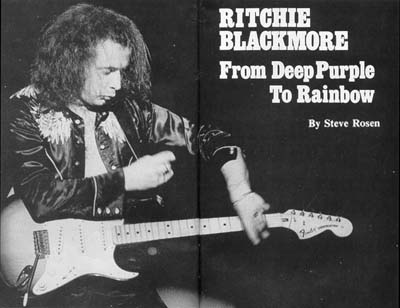 Introduction
Introduction
Page 1
Page 2
Page 3
Page 4
Page 5
|


WHEN RITCHIE BLACKMORE steps into the stage lights and begins to
play. his 22 years experience and high adrenalin turn him into a
self-described "aggressive bulldozer" of a guitarist. "I feel
like I own the stage." he says. Indeed, his scaring lead work
with Deep Purple and his natural evolution with Rainbow, his
current band, have carried him onto the stages of four continents
and his rccordings into the charts time and again - in one year alone,
Deep Purple sold over 14 million albums world-wide. Rainbow
recently released their fourth album, Long live Rock 'N Roll which
fuses the seemingly incongruous styles of classical, Renaissance,
German Baroque, and heavy rock music. "I criticize my own work
pretty harshly," Blackmore says, "yet I feel this is some of
the best music I have ever been part of."
Ritchie's musical initiation began in 1956. when at age 11 he got
his first instrument - a secondhand Framus Spanish guitar. He
lived near guitarist Big Jim Sullivan [see CP, Jan.'73], from whom,
he says, "I learned quite a lot of tricks." By the time he was 17
Ritchie was working as a session guitarist, often sharing duties with
Jimmy Page, [see CP, Jul.'77], and he joined Screaming Lord
Sutch's band in London. Sutch, one of the most colorful characters
in British rock during the '60s, modeled himself after American
blues singer Screaming Jay Hawkins. "Working with him was
terrifying at first anyway," savs Ritchie. "He did a stage act in
which he'd dress up like Jack the Ripper. He had shoulder-length
hair before anyone else, and every gig was an adventure. He taught
me to get out and give it to the people."
After several years apprenticeship with Sutch, Blackmore tired
of the British music scene and moved to Hamburg, West Germany.
He became a regular at the Star Club, backing visiting musicians
including Jerry Lee Lewis. In February 1968 Blackmore, organist
Jon Lord, and drummer lan Paice met in Hamburg and discussed
thc possibility of forming a group. They added bassist Nick Simper,
who had also worked with Sutch, and vocalist Rod Evans. By the
summer of the same year their first single - a hard rock version of
Joe South's "Hush" - was released in the U.S. Following the succes
of their first album, Shades Of Deep Purple, the band toured the
U.S. in October 1968. Though the band's first three alhums received
wide acclaim in the U.S., they did not release any recordings in
England until l970.
In July 1969, Evans was replaced by Ian Gillan, who would later
play the title role in the recorded version of the Jesus Christ
Superstar [MCA, 10,000], and Roger Glover took over as bassist.
While the new lineup rehearsed, Jon Lord began working on a
concerto for a rock band and symphony orchestra. On September
24, 1969, Deep Purple joined the Royal Philharmonic at Royal
Albert Hall; the performance met with wide approval from both
classical and rock reviewers, and was later released as Deep Purpie
And The Royal Philharmonic Orchestra.
Deep Purple spent a half-year working on In Rock, and the LP
was successfully received in both the U.S. and England in 1970.
Later that year the group toured Europe, and in May 1971, they
made their first trip to Australia. The hand scored further successes
with their following albums: Fireball in 1971, Machine Head
(reportedly recorded in a hotel corridor in Montreux, Switzerland) in
1972, and Made In Japan and Who Do We Think We Are? in l973.
Machine Head and Made in Japan both achieved gold-record
status soon after release. In 1973 Gillan quit the band, citing its
"lack of progression," and he was soon followed by Glover. By
1975, Blackmore had also tired of his role in Deep Purple. "Things
were getting a bit boring in rock and roll," he explaied, and he
began to seek new musical direction.
In spring, 1975, Blackmore teamed with fomer Elf vocalist
Ronnie James Dio. Blackmore found that Dio shared his interest in
medieval music, and many of the songs they began to write reflect
this interest. Joining Blackmore and Dio was Cozy Powell, who
had worked as a drummer for Donovan and Jeff Beck [se GP,
Nov. '75] and had three solo singles to his credit. They called
themselves Rainbow. Their original bassist Jimmy Bain was replaced
by ex-Widowmaker Bob Daisley, and keyboardist Tony
Carey was rcplaced by David Stone. Shortly after its formation,
Rainbow traveled to Munich, West Germany, where they recorded
Rainbow, their debut album. With his new band, Blackmore
claimed: "We're going to have much more emphasis on melody. In
other words, everything isn't going to be hung on a riff."
Ritchie has recently begun to study the cello. When asked if he
will soon be delivering cello solos in live performances, he answers:
"Maybe when I'm 40. It'll take me that long to really play it well."
-GP
* * * *
[cover]
[page 1]
|
|
